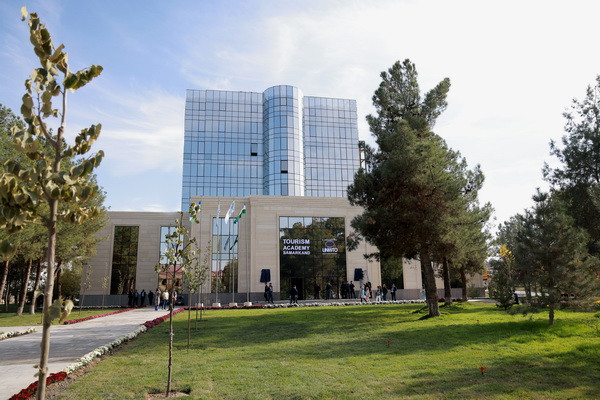
Tashkent, Uzbekistan (UzDaily.com) -- On 20 October, as part of the 25th anniversary session of the United Nations World Tourism Organization (UNWTO) General Assembly, the opening ceremony of the UNWTO International Tourism Academy took place in Samarkand. Its goal is to train a class of qualified professionals who will contribute to the development of the tourism industry and the economic sector.
The event was attended by the Minister of Ecology, Environmental Protection, and Climate Change of the Republic of Uzbekistan, Aziz Abdukhakimov, the Secretary-General of the UNWTO, Zurab Pololikashvili, ministers and heads of delegations from UNWTO member countries, media representatives, and others.
"Samarkand was once a center of advanced education and science on the Silk Road. In the New Uzbekistan, we value our history and traditions, and we especially focus on quality education, preparing a new generation of scholars and young leaders in various fields. In 2018, the International University of Tourism and Cultural Heritage 'Silk Road' was opened in Samarkand on the initiative of the President of Uzbekistan, Shavkat Mirziyoyev," said A. Abdukhakimov at the opening of the event.
"Today, at the initiative of the head of our state, the International Tourism Academy has been opened, with the main goal of improving the quality of education and developing human capital in the tourism sector," added the minister.
In his welcome speech, Zurab Pololikashvili emphasized the importance of education in tourism development and the opening of the International Academy during the anniversary session of the General Assembly.
"I am happy to be present at the opening of the Academy just 9 months after the initiative to establish it was proposed. At that time, I didn't believe it would be possible, as there was little time left before the start of the General Assembly. But thanks to the support of President Shavkat Mirziyoyev of Uzbekistan and the efforts of Minister of Ecology Aziz Abdukhakimov, we were able to hold the opening of the Academy today, with the presence of tourism ministers from member countries of the Organization. They can see and learn about the opportunity for tourism education in Uzbekistan. I am at a loss for words to express how delighted I am to be a part of this," said Z. Pololikashvili at the opening.
"This is an important step not only for UNWTO or Samarkand but for tourism itself," added the Secretary-General.
In addition, Z. Pololikashvili called on the tourism ministers and heads of tourism administrations present at the ceremony to actively participate in organizing the activities of the Academy and in teaching during the educational process.
During the event, a tour of the University and the Tourism Academy was conducted, opening of memorable plaques, and the activities of the UNWTO Regional thematic office in Samarkand were presented.
It is worth noting that the Academy's curriculum is developed based on the experience of Swiss hospitality schools. Foreign consultants will be involved in the training process. Upon completion of the Academy, graduates will receive a certificate recognized by partner educational institutions. After completing each module, students will have the opportunity to gain practical experience through internships in private sector partner companies.
The organizers of the Academy are the Government of Uzbekistan and the United Nations World Tourism Organization (UNWTO).
The UNWTO's role in the Academy includes building an educational model based on international experience, adapting training programs to local conditions, training mentors through ToT programs, supporting institutional development, assessing student rankings, providing consulting services to improve the quality of education, ensuring international recognition and certification of programs.
Uzbekistan’s contribution to the activities of the Academy is the replication and adaptation of training programs to local conditions, assistance in training mentors through ToT programs, providing financial support for projects, assisting in student employment, improving and adapting programs, assessing student rankings, and conducting information and awareness-raising activities to promote the programs, and more.